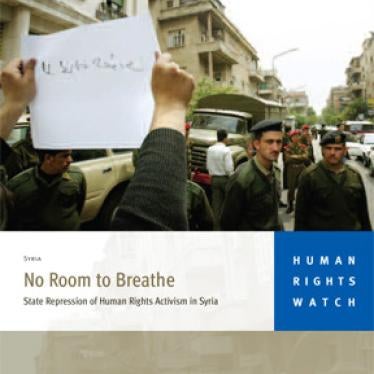Syrian authorities should stop restricting the freedom of human rights activists to express their views and to associate as a group, Human Rights Watch said in a report released today. The country’s security services regularly harass the activists by arresting them and preventing them from meeting or traveling.
The 46-page report, “No Room to Breathe: State Repression of Human Rights Activism in Syria,” documents the restrictions imposed on activists by examining the legal environment in which they operate and the government practices to which they are subject. It also charts the development of Syria’s human rights community and the challenges it faces today. It is based on extensive interviews with representatives of all of Syria’s major human rights groups, independent lawyers, and members of the international diplomatic community in Damascus.
“The human rights community in Syria has grown in important ways in the last few years, but they remain under siege by authorities that cannot fathom any criticism of their record,” said Sarah Leah Whitson, Middle East director at Human Rights Watch.
Under Syrian law, the Syrian Ministry of Social Affairs and Labor controls the registration of all civil society associations and has wide jurisdiction to intervene in the internal governance and day-to-day operations of any association by appointing board members and attending meetings. Despite these very strict control mechanisms, Syrian authorities have refused to recognize any of the human rights groups that have applied for registration.
“Without legal status, these groups operate at the whim of the authorities and live in constant fear of being shut down,” said Whitson. “They cannot even rent a place to meet.”
The report concludes that the most serious barrier to the rights and freedoms of Syria’s human rights community lies in the role of the powerful security services, which routinely harass human rights groups by breaking up meetings, banning activists from traveling, and arresting them.
“Activists who dare to document government violations end up being charged for dubious crimes such as ‘weakening national sentiment’ or ‘spreading false news’,” said Whitson.
In April 2007, a Syrian court sentenced one of the country’s most prominent human rights lawyers, Anwar al-Bunni, to five years in jail in connection with a statement he had made claiming that a man had died in a Syrian jail due to inhumane conditions there.
The Syrian government often justifies its intolerance of criticism by arguing that it is presently under threat from the United States and other Western countries that are seeking to isolate it, and that any criticism of the government will only serve the interests of these foreign powers. However, state repression of human rights activism is not a recent phenomenon in Syria, and its victims usually have no link to foreign powers and are themselves critical of US policy in the region.
Human Rights Watch called on the Syrian authorities to cease arbitrarily arresting activists and to free any activists it has detained for exercising their right to freedom of expression. It also urged the government to amend existing law and practice to allow human rights groups to legally register and operate free from any governmental interference.
The report urges the international community to ensure that human rights concerns are at the core of any future talks or negotiations with Syria and to support human rights activists in Syria by advocating on their behalf with Syrian authorities and providing logistical support through capacity-building programs.
It also calls on the UN Special Representative of the Secretary-General on human rights defenders to request a visit to Syria to examine the situation of human rights defenders in the country.







